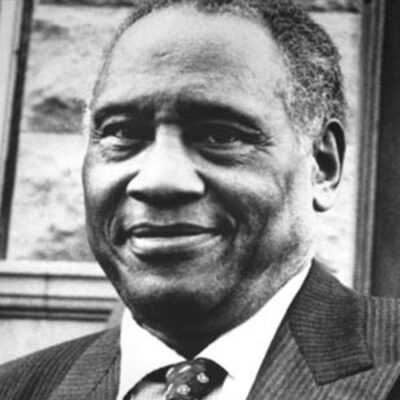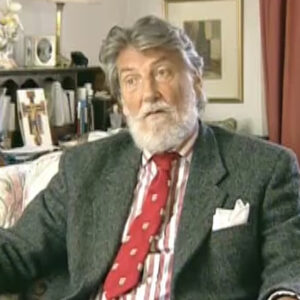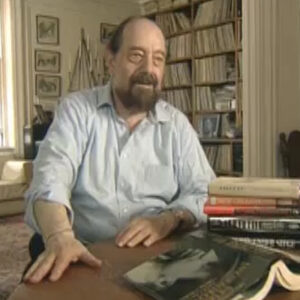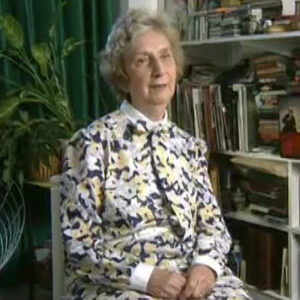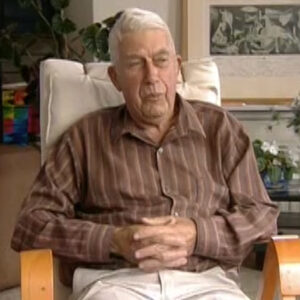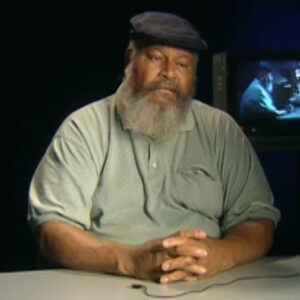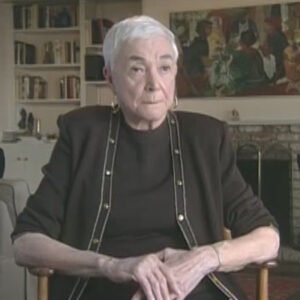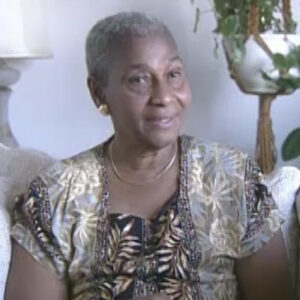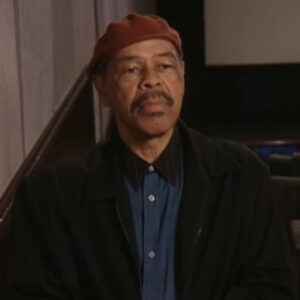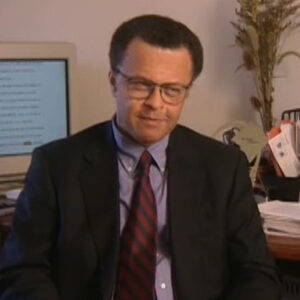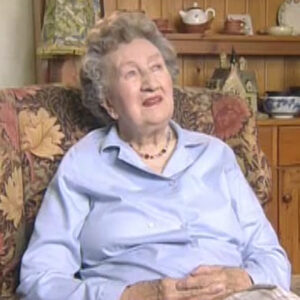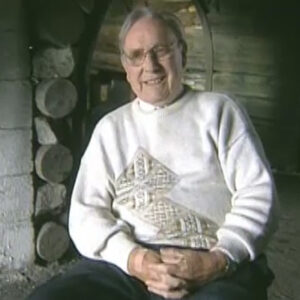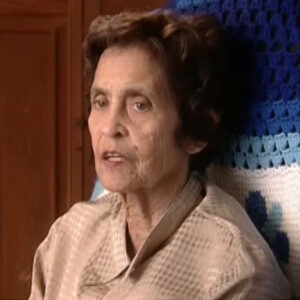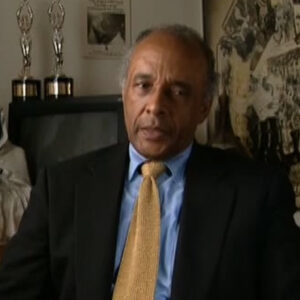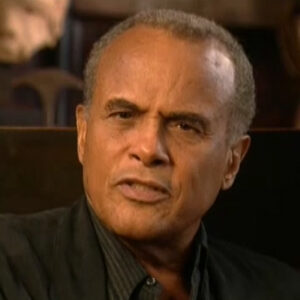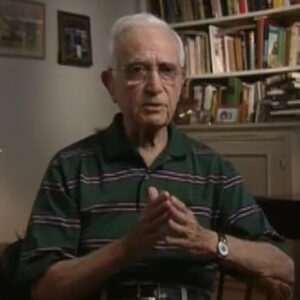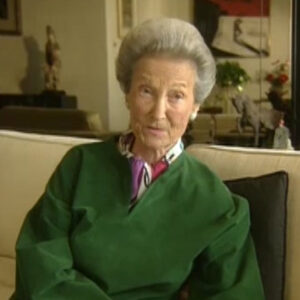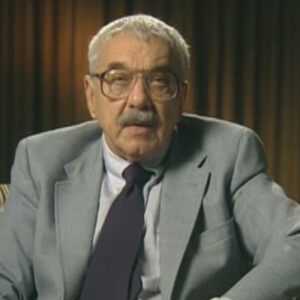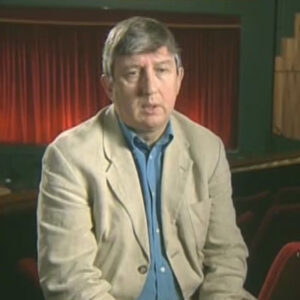Speaker OK, finally. Right. OK, so we’re really talking about yo. Yes, also full name.
Speaker Her full name, Yolande Jackson.
Speaker And, uh, what was your relationship to her? I’m her niece. OK.
Speaker As a child, obviously, you heard little bits and pieces, what did you hear?
Speaker Yes, she was a rather mysterious character in some ways. I remember meeting her with my grandmother. She used to come and stay at my grandmother’s house when I was also staying, but my grandmother died when I was six. So there’s a quite early memories. My mother didn’t like her. It has to be said strongly, didn’t like an element of malice there. So what I heard tended to be that Joan drank too much in later life, that she’d been wild when she was young. I knew she’d had a number of affairs. I knew she’d been married twice, both occasions, disastrously. I knew that she’d had an affair with Paul Robeson. But it was always slanted from perhaps my mother’s angle to look at the worst side of it rather than a fair assessment. My father, I knew, had been very close to his sister. He obviously still was. But he never talked about her much, I suppose, because of domestic harmony. He was very fond of her. What did she look like? When I knew her through a child’s eyes, she was dramatic, I can remember that she was talking about the 50s here when England was quite sober. And I remember she used a hands a lot. She she would sweep into a room and sit rather elegantly as opposed to just coming in and sitting like the rest of us. I knew she was beautiful when she was younger. Her coloring was still quite spectacular. She had auburn hair and sort of blue green eyes, which is, you know, you’d notice in anybody, uh, um, now.
Speaker What and what I mean, most of what you heard is in hindsight, yes, yes, but at what point did where was she in her life, as far as, you know, when she met or what was happening?
Speaker She’d been married once to an American. The marriage lasted three weeks in total. It was not a success. I my knowledge of her then is patchy. I knew she was on the stage. I know she’d been out to Hollywood sometime, either during when she knew Paul Robeson or before because my father’s family were friends with some people called Bruce in America. He was one of the brothers, became the American ambassador to Great Britain, I believe, in the 60s. And my grandfather knew the great grandfather of the Bruce was ambassador because my grandfather didn’t marry till he was 58. So there was a generation gap. And in fact, I knew Yale and went out as a very young woman to the states.
Speaker And it was quite amusing because the Bruces who matter well, the generation on and they thought a woman in her 50s would be appearing and she thought they were all going to be about 24. So there was a little bit of a clash there. But other than that, I knew she’d been out to Hollywood, but not much more.
Speaker I knew she’d been. I’ve been in love with the wrong word. I knew a man called Victor Sassoon have been in love with her. He was a Jewish Passey, I think, living in India, a very rich man. My parents met in his house through yeomen’s good offices, but my father thought that it would be a very good idea if she married him. He said he’s a very rich man. He loves you, but he was quite a lot older than her. She didn’t marry him. This one this was after this is before she met Paul Robeson, well before that late 20s. Then she got engaged to a Frenchman. I don’t know his name again. I think, you know, he was pretty well off and apparently very nice family, etc. She came out to Paris. My parents, then newly married, came out to meet the family. The Frenchman’s hobby was jazz music, and he’d formed a small jazz group with a number of Americans. She ran away with one of the Americans. My parents staying in Paris with the family preparing for the wedding. She ran away the marriage. The American goudey lasted three weeks, and I think it was after that she met Paul Robeson.
Speaker Boy, yes, she was quite a go to, um.
Speaker Now, from we’ve heard that he really he really got the ball.
Speaker I mean, what are what are the rumors or I’ve heard the other way that he really got to her and that he decided to break off the relationship because he went back to his wife.
Speaker And I’d always imagined, though, I have to say, that it was not put in words that she married Miss Chavez should see the Georgian prince on the rebound from Paul Robeson.
Speaker Perhaps to show him, you know, I’ve got a prince now. I don’t know, but I mean, I always imagined that nobody ever said it.
Speaker What kinds of do you think that there were social pressures on her from the family because he was black or because he was an entertainer or because he was a wonderful person?
Speaker No.
Speaker Well, I don’t know the mother of his brother, Paul.
Speaker He my father liked Paul Robeson that I knew. And he certainly admired him as a performer very much. He equally would have disapproved of his politics. My father was right wing, the communist, but he would not have liked. But he might have thought, well, understandable in that he was I think Paul Robeson was quite poor as a young man before he made a success. I expect hope that it would pass. But he always talked of him as a performer and about, oh, my mother different again. She was, I have to say, racist. I think she would have minded him being black. Certainly the way she spoke of the Indians, because she, too, was brought up in India was not as of somebody referring to equals. That was how her family rather thought at that period, which was, I have to say, quite typical of the period. I would say my father’s family were more atypical than my mother’s.
Speaker What let’s suppose that we were talking earlier, um, it could have gone either way, in other words, in other words, you heard that he left. Yes, we heard that she left him.
Speaker It could have been either, I think.
Speaker Were there any there were also rumors of a child or that I never heard rumors of at all from my parents. The only thing is an unknown.
Speaker Could you say what the rumor?
Speaker Well, I’d never heard rumors of either a child being born to Yelland and Paul Robeson. I’ve never realized, in fact, that the affair was so deep as it apparently was. I’d imagined she’d very much fallen for a successful man who was an entertainer, and she herself, in a much lesser way, was an entertainer. And then but he was a married man and he decided to go back to his wife. The only thing I’d heard again from my mother so I had may have no truth in it at all was that his wife took her seriously because his wife got a witch to put a spell on the island to make a back off and go away.
Speaker Perhaps it worked. I don’t know. Yeah. As his wife was not a witch, you know, from what I gather, she sounds wholly unlikely. I think that’s one of those myths. Maybe wish fulfillment. Maybe so. Maybe so. Yes. Yes, that’s right.
Speaker That’s true. Um, you know, let’s see if if if she left, Paul, as we’ve heard from our, uh, you know, it’s interesting that the reason I bring it up is.
Speaker Years later, Paul was was in a depression. Yes, and there were rumors, rumors that Yolan visited him here in England when he was sick. But have you heard anything about.
Speaker No, but was that very much later sort of after the war? Yes. I wouldn’t have heard. I mean, I was born in 44, so I’d have been a small child. No, I never heard that, but I wouldn’t have heard. I mean, you have to understand that children weren’t told as much as they would have been today. I had a nanny when I was small. It would have been unlikely. I’d have heard that.
Speaker Um, what?
Speaker Tell me a little bit more about her as much as you know. Yeah. You know how she got into the theater or why?
Speaker No, I don’t, except that I can guess. But my grandmother was always very interested in the theater. And when my grandfather died, she married an actor from the well, what’s now become the Royal Shakespeare Company. She was great friends with somebody called for Frank Benson, who was one of the famous actor managers of the Times. He did a lot at Stratford and in London, too. And it was one of his company that she married, a man called Benton, and I imagine through that year and met a lot of actors and became interested in the stage. My grandmother was always very interested in the stage and in music. She was a great founding father.
Speaker Why do you think that is? Yeah, there’s a flip flop.
Speaker OK, cool.
Speaker Um, uh, I’m curious now about these three things I want to get into to find out. Again, what do you think? What was the reaction or what do you think the reaction of those parents?
Speaker Well, my grandfather would have been dead by the time she met Paul Robeson, he died in 1931, so I think he’d probably have been dead. I think my grandmother would have been quite enthusiastic. She was, as I say, a great fan of theatre, rather musical. She played the piano rather well. I know that he went down to Hurst Grange several times because my father mentioned that. So I imagine, though, that what should have thought of him being married, I don’t know.
Speaker But I have a feeling that perhaps the attitude could have been a little bit lax. After all, she had a daughter already divorced once. She was allowed a lot of freedom, much more again than most girls were allowed.
Speaker So.
Speaker So Paul actually met your grandmother? Oh, yes. Oh, yes. Yes.
Speaker And they go out publicly and hang out together. I understood they did, certainly in England. I couldn’t stay in the United States, but in England they did.
Speaker It was not hidden.
Speaker It was not a no no, which must have been very hard for Mrs. Rabson.
Speaker I think if you could say that from there, that was public, it was public, yes, yes.
Speaker As far as I know, certainly my parents or my father mention Paul Robeson in connection with Ireland. And, you know, he told me about him singing his singing and singing show, but he had some of his the old records at that time with him singing.
Speaker So now let’s say.
Speaker Uh, they did continue a relationship and.
Speaker Could you talk about this paper?
Speaker Yes, this happened about 20 odd years ago, my cousin on the other side of the family, not Jackson’s, was an article clerk to a firm of solicitors who’d acted for my father’s family for many years. And the solicitors had, in their keeping a safe deposit box and a number of files dealing with Joe. And then by then, the Princess Schervish should see her affairs, I believe the wife of one of the partners, perhaps I want to say that because it’s not very kind. But she was dealing with the filing and it got in a bit of a mess. My cousin, an article clerk, and one of the other article clerks who should have obviously been doing something else, had a jolly good read of all these papers. And I suppose they open the safe deposit box and had a jolly good look and which they shouldn’t have been allowed to do. My cousin, then pretty young, about 20, came back and joked about whatever he’d found in there. And my mother, who, as I said, was not my aunt’s biggest fan, was almost pleased about it. And so I said to my father, There you are, you know, now you see, my father was absolutely incensed. He rang the lawyers that day and he said, I want my special career or my sister’s papers brought down to me. Everything you hold of hers is to be brought here now, which it was. And he burnt the papers. I don’t know what was in that at all. He never he never discussed it with me at all or spoke about it. But I knew he’d been very hurt at being of being laughed about and also very upset that the solicitors had frankly been so indiscreet and he was upset about the whole thing.
Speaker But now, again, I mean, this just goes away. Yeah. What if what in those times, what was the reaction of families like yours to, you know, the children or grandchildren who had illegitimate.
Speaker Gosh. Oh, no.
Speaker Did they kind of try to shut it up again, I expect it varied a bit, but there could have been two reactions. Bluntly, if a girl got pregnant, she would often have a little trip to Switzerland and she would be the people. So she’d gone away to stay with friends. She had an unfortunate love affair, was getting over it and needed to rest with relatives in the country. And she’d have an abortion and come back to England, where, of course, abortion was illegal at that time. The other reaction would have probably been to have the child adopted. She would have gone away for a little rest in the country. The child taken from her and adopted by somebody, the Jacksons. It would have surprised me if they had done that because my grandfather was illegitimate and he knew it. And the family’s concerned were both quite, quite grounded with the money they fessed up, paid. He was adopted by a family called Jackson, who are tea planters and salon. But his education in England was paid for by his royal families and the Turton side, which was his mother’s side. He became friends with them and they remained in contact all his life and in contact with my father. And and I know that while she was alive, there was no attempt to hide it. I mean, he was called Jackson, but he knew. They knew he was one of them.
Speaker OK, so that’s what would have happened had there. And that was basically the reaction of a Melbourne woman. So if you had gotten pregnant and basically one of those two scenarios, I would think so.
Speaker In her case, it is they were not a typical family of the period. Let me say. They also have plenty of money, which means your options are much wider open. I would have guessed she would have recognised the child, but he was a married man. Maybe they’d have done what happened to my grandfather had had him or her adopted, but kept on recognising and paying for.
Speaker So.
Speaker Ultimately, let me just ask you flat out, you know, we’ve talked about it. Do you think that the possibility of a child between them is, in fact, real?
Speaker I think there’s a strong possibility, yes. I mean, if there was a very intense love, a love affair, if when he decided to go back to his wife or she ditched him, whatever, or could it be something a little bit less than that? She was a very strong willed woman. I wonder whether she perhaps didn’t try and force him to ditch his wife quickly. If he was a kind man, he may have thought, I can’t do this. I think she’d have been the kind of person who might have flown off in a rage and married somebody else, which he did, and presumably had the child or could the child have been adopted in France? She had a lot of contacts in France. She married Mischa in England, I believe, but they lived in France and she met him in France because a lot of the white Russians lived in Paris.
Speaker This is really interesting. Nothing really interests me is that they had the hope that they actually got and if he had left his wife and yes, they married. Yeah.
Speaker That would have been a heavy I think it would, but I’d have thought they both were strong enough personalities and characters to take it. I should think it would have been quite a dramatic marriage, don’t you? Two strong characters sort of each wanting their own way. But I wouldn’t have thought I mean, I don’t know enough about Paul Robeson, but I wouldn’t have thought I’ve cared enough about what the world thought of them to have really been upset. By it, I don’t know.
Speaker Well, the thing is, is that Wilson was very public, you’re right. Yeah. And but what was really someone can you see that? OK. What was really interesting is that a lot of his showbiz celebrity friends were black from America, wouldn’t have liked it. Well, they came back and said, don’t do it.
Speaker Yes. And I must have been people here who said it. I mean, certainly my mother would have said it to her. The must have been, if not her own family, other friends, who would have said to her, you know, this is going to be a terrible mistake. You’re going to be an outcast, all this sort of thing. I would have thought if they felt strongly enough, they they would have risen above it. They were both performers and there would have been enough people in the stage who would have said who just stayed their friends.
Speaker I’m certain the black people.
Speaker OK, yes, she appeared in this theatre, albeit only for two nights before. And I understand. And she appeared she performed for answer for the troops during the war. I understand she appeared for the comedy forces after the war.
Speaker She’d been to Hollywood. She’d done other things on the London stage, nothing. She was not in Paul Robeson’s league, frankly. And I suspect that had she married him, his career would obviously have been the important one. But she’d have enjoyed the party as the being with him, the being seen and all his friends. And and, of course, they would have in time moved into a much more tolerant climate, both in the United States and here.
Speaker You know her as a personality or psychological makeup. Do you think that she was rebelling against something? I mean, or was he just naturally an extrovert?
Speaker I would think she was naturally an extrovert. Certainly she may have been rebelling against the general atmosphere in her times. I mean, she went to redeem, you know, one of the largest English public schools for girls for one term and said at the end of that, that was it.
Speaker You know, she’d done that and she went back home and had a governess again.
Speaker My grandmother was very, very indulgent to her children. I mean, if they didn’t like my eldest uncle was cut out of my grandfather’s will because he left Eton at the beginning of the First World War and joined up the London Scottish Regiment as a private soldier and sort of waiting, as my grandfather thought, a better idea. Finish Eton and then you become an officer, trained as an officer and go out and do your stuff that way. But and he survived the whole of the First World War as a private soldier in the trenches in France, which was you know, he was one of the contemptibly, I suppose. But I always think that shot his health to bits he took to drink and cocaine and fell apart after the war.
Speaker So we’ll see if he has something to rebel against.
Speaker Yes. I think she must have found the society of her times very strange. I mean, she was of an era where girls of her background were still chaperoned if they went to a party or a lot of them still were. And they were kept nice little girls at home, very innocent, rather emotionally younger, I would say, than their contemporaries, now possibly older and the taking of responsibility, which duty, obedience, etc.. And her upbringing wasn’t like that at all.
Speaker If she really was stunning.
Speaker Yes, she was. Yes. Stunning and wonderful colouring, which unfortunately, the photographs of those time don’t you don’t show because she had the auburn hair and blue green eyes, which would have been wonderful with a rather pale skin.
Speaker Is it something they missed? Know, I just like to know if you could just wait. OK.
Speaker Right. Well, the marriage the Russian prince ended when he ran away with the then Lady Rothschild. He was, I think how very unkind to say that then the white Russians who came out after the revolution weren’t trained much. So probably he was a gigolo. My father was there when he saw me in an orange. You know, it was going to be a disaster. No man should make an orange look like a flower. But he ran away with Lady Rothschild in the south of France. And I was always told that’s when Germans started to hit the bottle because my mother was staying with somebody called a news pitchman in Paris. Yolan came to Paris from the south of France and saw them there. And my mother said, oh, yes, she’d hit the bottle. She was putting on weight. She was beginning to lose her legs. Then came the Second World War. And of course, she she lost weight. She performed for the troops. And I suppose it gave her something to think about it and put it like that. Then after the war, I understand she performed for the comedy forces and then I’m afraid it was a downward slide. She was an alcoholic. She had some great friends, two of whom the those who were, I believe, Italians. But living in London were wonderful to her. She lived with them and they she went in and out of various clinics for drink problems. But she never was able to kick the habit for any length of time. So I suppose deep depression. So and she died much in about I think it was about 1960 still, I’m afraid, drinking.
Speaker Hey, is there anything else you want to say just about your thoughts about, you know, this obviously mysterious but interesting woman? Yes, really? Yeah.
Speaker Well, I think that she was unlucky in perhaps the period she was born. If you think of a young woman now in her 20s who should have had far more opportunities to travel. I mean, she did travel a great deal so she wouldn’t have been atypical. And if she Robeson had an affair, well, people are much more tolerant of affairs now. People are less racist, I think. Well, having said that, some people are. That’s right. But the circles in which they moved would have been far less racist. I think she probably might have married him, but I don’t know, because there’s something a bit missing to me because I don’t think it was I don’t think it was about the color thing. I think it was something about control, because three times I think he was the man she really fell for. But there was a Victor Sassoon before the Frenchman whose name I don’t know, and Paul Robeson, all of whom would have been in, quote, good catches, you might say. So she marries an American. Give me an American drunk who plays the saxophone for a Frenchman in a sort of amateur band. She then marries a white Russian gigolo. They’ve both got to be. Mr. Imprint’s wrong. Perhaps she like men who are a bit she could control of it. Well, thought she could control. Um, in fact, of course she couldn’t because one ran away and the other. I don’t know what happened really. They just parted. But maybe that’s the only that’s the most likely thing I can think of, because she was obviously a very strong personality. I mean, you’ve got my mother disliking her. You equally got the gamblers who were true and good friends through thick and thin to the end of her life. My father, who she was very difficult in her latter years, it has to be said, because she never got used to not having money.
Speaker She should run through it, run through what she had, but she would go to the Savoy or Claridges and calmly say, oh, my brother will pay, having stayed there for a week, you know, which was not good.
Speaker What what the what did you know of and you just growing up and I knew that she was much admired as a singer and I’d heard some of his records.
Speaker Um, I knew that he was married because I knew that she’d had an affair with him while he was a married man. I knew that he was a communist and that his politics, I believed, were important to him. But that was about it really. Well, I knew that he’d been hung up by I think he was, wasn’t he? Before the un-American Activities Committee? I’d heard that when I was growing up, I had about.
Speaker Well, this is really interesting, I wish we could get the yes, I’d like to know if I’ve got a cousin up there.
Speaker So yeah, that’s all conjecture, something much stronger.
Speaker I think it would have been something stronger than love letters because he knew they’d been in love. I mean, he knew about the whole affair. I mean, in a sense, he’d been in on it. He’d met Paul Robeson with my grandma. No, I think it was more than than the love letters I’d never heard at that point when the stuff was burned about speculation that she’d had a child. But I’d assumed that when thinking back, it’s rather unlikely, but I’d assumed it was something that they’d seen about her drinking habits and, you know, in recent years. But I know it was a very strong reaction actually to to whatever was there. I don’t think love letters would have brought it on. No.
Speaker From France in the 30s from the French would have been much more tolerant. Yes, yeah, yeah.
Speaker Well, just for the record, right. You talk about your and the fact that she’s right.
Speaker Yes, right. Yes, she was. I was on the stage. In fact, she performed here at the Aldwych for two nights.
Speaker And I can’t remember the name of the play, I’m afraid.
Speaker And she performed up gather in other theaters. And I think the lyric was one of the theaters mentioned the Duke of York, but she didn’t do it, didn’t have a huge career on the stage.
Speaker It’s. OK, hi. Yeah, yeah. Uh, yeah, you can just just say that in your line of work.
Speaker Yes, well, we were certainly seen in public in England. I don’t know about the United States, but they went to my grandmother’s house. My grandmother entertained enormously. They must have been seen and known as a couple a lot of people on the English stage, Sir Frank Benson and his company of actors, because as I told you, my grandmother married one of the actors, Benjamin. They all knew about their affair. And as I say, it must have been hard for Mrs. Robes. And I don’t know whether she was in this country, but it must have been very hard for her because I think they appeared as a couple quite regularly in London and in Worthing where my grandmother lived.
Speaker OK, that’s good. All right. That’s really good. Yeah, absolutely.
Speaker I know that, Mrs. Robinson. I’ve heard that Mrs. Robeson viewed here as a serious threat, hence the witchcraft story. I mean, I think that’s probably difficult, but the myth comes from the fact that she viewed it as a serious threat. She didn’t think, I’ll sit this one out. It’ll pass. We’ll go back to America. He’ll forget she was worried. She thought it could end the marriage, obviously. So it must have been very serious between them.

